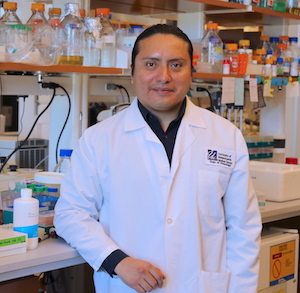 |
|
|
Rodrigo Lopez Gonzalez, PhD |
Rodrigo Lopez Gonzalez, PhD, has been awarded the 2019 Alzheimer’s Association Research Fellowship to Promote Diversity to support his research into frontotemporal dementia (FTD) and genomic instability and to help his transition from postdoc to independent investigator.
Dr. Lopez Gonzalez, a postdoc in the lab of Fen-Biao Gao, PhD, the Governor Paul Cellucci Chair in Neuroscience Researchand professor of neurology, will receive $175,000 over a 3-year period to study the pathogenic mechanisms associated with FTD.
“This research support will allow me to develop a new research direction, examining the potential role of genome instability; specifically, telomere shortening, chromosome abnormalities and epigenetic regulation in the pathogenesis of C9ORF72-related FTD,” Lopez Gonzalez said.
FTD is a group of brain disorders caused by progressive nerve cell loss in the frontal or temporal lobes of the brain, according to the Alzheimer’s Association. FTD, which is less common than Alzheimer’s and frequently misdiagnosed, affects roughly 60,000 people in the United States, according to The Association for Frontotemporal Degeneration.
For several years, Lopez Gonzalez and colleagues have studied how the genetic variation in a gene calledC9ORF72may give rise to FTD. Using patient-derived induced pluripotent stem cells (iPSC) lines, they have been able to differentiate the lines into neurons to better understand FTD pathogenic mechanisms. Lopez Gonzalez’s examination of neurons derived from C9ORF72expansion carriers has allowed him to contribute to the discovery of several novel pathogenic phenotypes, including nuclear cytoplasmic transport defects, RNA splicing abnormalities, oxidative stress and DNA damage.
With support from the grant, Lopez Gonzalez said he will study FTD by establishing new brain organoid cultures from control and patient induced iPSC lines.
“Brain organoids provide a unique system with a relevant physiological context for modeling neurological disorders, because they self-organize and can form a three-dimensional assembly of neurons and glial cells that are able to make functional connections,” he said.
This model will allow Lopez Gonzalez and other researchers to more effectively study interactions between cells, which is difficult to perform in neuronal monolayer cultures.
“It is critically important to speed up research on the pathogenesis of these diseases to be able to develop therapies to treat them,” Lopez Gonzalez said.